
The Memory of Earth (1992) is a science fiction novel by American writer Orson Scott Card. It is the first book of the Homecoming Saga, a loose fictionalization of the first few hundred years recorded in the Book of Mormon.

Gwydion fab Dôn is a magician, hero and trickster of Welsh mythology, appearing most prominently in the Fourth Branch of the Mabinogi, which focuses largely on his relationship with his young nephew, Lleu Llaw Gyffes. He also appears prominently in the Welsh Triads, the Book of Taliesin and the Stanzas of the Graves.

The StoryTeller is a live-action/puppet television series that originally aired in 1987 and which was created and produced by Jim Henson.

Edmund Pevensie is a fictional character in C. S. Lewis's The Chronicles of Narnia series. He is a principal character in three of the seven books, and a lesser character in two others.

Randall Flagg is a fictional character created by American author Stephen King, who has appeared in at least nine of his novels. Described as "an accomplished sorcerer and a devoted servant of the Outer Dark", he has supernatural abilities involving necromancy, prophecy, and influence over animal and human behavior. His goals typically center on bringing down civilizations through destruction and conflict. He has a variety of names, usually with the initial letters "R. F." but with occasional exceptions, such as Walter o'Dim and Marten Broadcloak in The Dark Tower series.
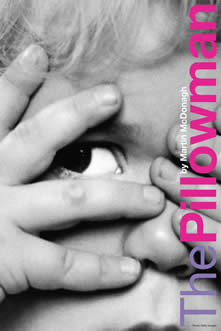
The Pillowman is a 2003 play by British-Irish playwright Martin McDonagh. It received its first public reading in an early version at the Finborough Theatre, London, in 1995, also a final and completed version of the play was publicly read in 1998 and then finished and released as a book in some places in 1999. Production started in 2000 for the eventual 2003 performance. It tells the tale of Katurian, a fiction writer living in a police state, who is interrogated about the gruesome content of his short stories and their similarities to a number of bizarre child murders occurring in his town. The play received the 2004 Olivier Award for Best New Play, the 2004-5 New York Drama Critics' Circle Award for Best New Foreign Play, and two Tony Awards for production. It was nominated for the 2004 Evening Standard Award for Best New Play.
Children of the Red King is a series of ten children's fantasy, school and adventure novels written by British author Jenny Nimmo, first published by Egmont 2002 to 2010. It is sometimes called "the Charlie Bone series" after its main character. A series of five books was announced in advance, completed in 2006, and sometimes the books were called the "Red King Quintet" until its continuation.
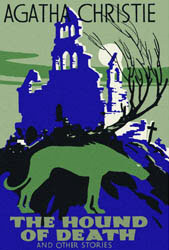
The Hound of Death and Other Stories is a collection of twelve short stories by British writer Agatha Christie, first published in the United Kingdom in October 1933. Unusually, the collection was not published by Christie's regular publishers, William Collins & Sons, but by Odhams Press, and was not available to purchase in shops.
The Little Lame Prince and his Travelling Cloak is a story for children written by Dinah Maria Mulock Craik and first published in 1875. In the story, the young Prince Dolor, whose legs are paralysed due to a childhood trauma, is exiled to a tower in a wasteland. As he grows older, a fairy godmother provides a magical travelling cloak so he can see, but not touch, the world. He uses this cloak to go on various adventures, and develops great wisdom and empathy in the process. Finally he becomes a wise and compassionate ruler of his own land.

Wieland: or, The Transformation: An American Tale, usually simply called Wieland, is the first major work by Charles Brockden Brown. First published in 1798, it distinguishes the true beginning of his career as a writer. Wieland is sometimes considered the first American Gothic novel. Wieland is often categorized under several sub-genres including gothic fiction, horror fiction, psychological fiction and epistolary fiction, which are listed at Project Gutenberg. Major themes include religious fanaticism, sensationalist psychology, and voice and perception.

Legion is a 1983 horror novel by American writer William Peter Blatty, a sequel to The Exorcist. It was adapted for the film The Exorcist III in 1990. Like The Exorcist, it involves demonic possession. The book was the focus of a court case over its exclusion from The New York Times Best Seller list. Blatty based aspects of the Gemini Killer on the real life Zodiac Killer, who in a January 1974 letter to the San Francisco Chronicle had praised the original Exorcist film as "the best satirical comedy that I have ever seen".

What Is the What: The Autobiography of Valentino Achak Deng is a 2006 novel written by Dave Eggers. It is based on the life of Valentino Achak Deng, a Sudanese child refugee who immigrated to the United States under the Lost Boys of Sudan program. It was a finalist for the National Book Award.
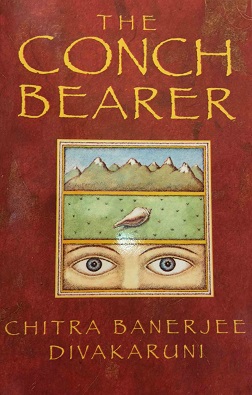
The Conch Bearer is a fantasy novel written by Chitra Banerjee Divakaruni.

How Awful About Allan is a 1970 American made-for-television horror psychological thriller film directed by Curtis Harrington, the first of two collaborations with writer Henry Farrell, and starring Anthony Perkins and Julie Harris. It premiered as the ABC Movie of the Week on September 22, 1970, and was produced by prolific television producer Aaron Spelling.
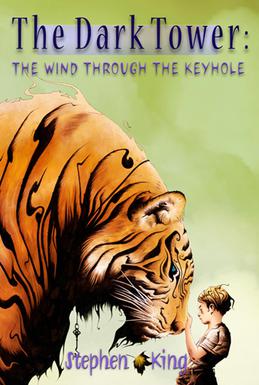
The Dark Tower: The Wind Through the Keyhole is a 2012 fantasy novel by American writer Stephen King. As part of the Dark Tower series, it is the eighth novel, but it is set chronologically between volumes four and five. First mentioned by King in 2009, after the controversial ending of the seventh novel in 2004, the book was officially announced on King's official website on March 10, 2011.
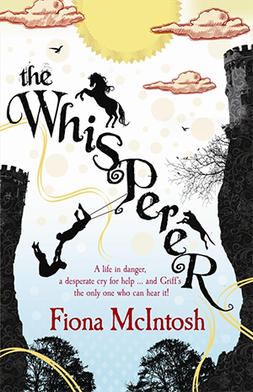
The Whisperer is a 2009 fantasy novel aimed at pre-teens and teens by Fiona McIntosh.
Disciplina clericalis is a book by Petrus Alphonsi. Written in Latin at the beginning of the 12th century, it is a collection of 33 fables and tales and is the oldest European book of its kind.

Later is a crime/horror novel written by American author Stephen King, published on March 2, 2021, by Hard Case Crime. The book is available in paperback format with a limited hardcover release. The paperback edition features cover art by Paul Mann, and the limited hardcover features cover art by Gregory Manchess. The 7 hour audiobook is read by Seth Numrich. This is King's third published work with Hard Case Crime, following the release of The Colorado Kid and Joyland.

The theme of blindness has been explored by many different cultures throughout history, with blind characters appearing in stories from ancient Greek mythology and Judeo-Christian religious texts. In the modern era, blindness has featured in numerous works of literature and poetry by authors such as William Shakespeare, William Blake, and H. G. Wells, and has also been a recurring trope in film and other visual media.
















